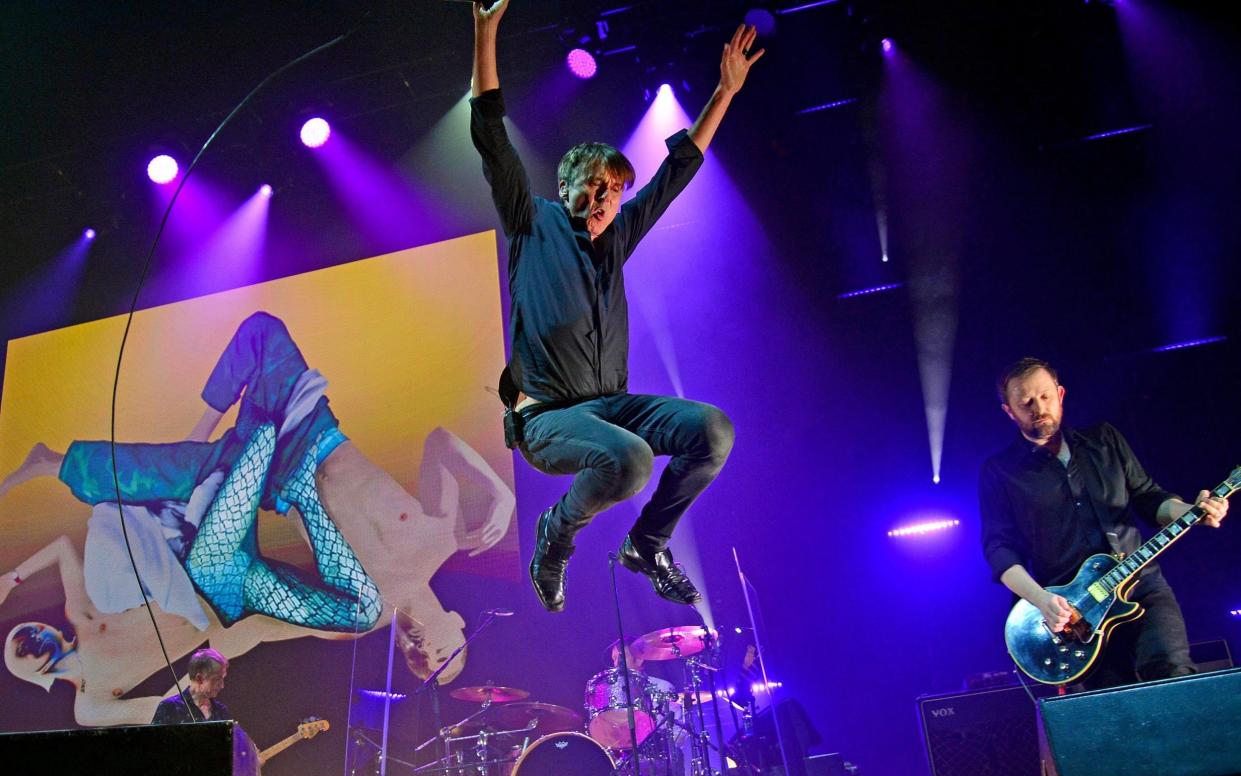Suede, review: nostalgic anthems for a wasted generation

We're so young!” crooned 54-year-old Brett Anderson, standing tall on a sound monitor at the front of the stage, one arm raised aloft, eyes gleaming, sweat drenching his open necked black shirt, like a deranged goth preacher addressing his congregation on an impossible article of faith. And 10,000 middle aged fans defiantly took up the refrain, answering back: “And so-o-o-o-o-o-o gone!”
Suede’s spirited return to the post pandemic stage offered a glorious reminder of the power of pop music to suspend time. Of the Britpop big four, only Suede are still on the road, giving it all they’ve got. Blur, Oasis and Pulp have broken up, with all members splitting off to pursue solo and side projects. But Anderson is leading his mob of unapologetic reprobates out once again in a line-up unchanged since their mid-90s glory days.
On this twice postponed UK tour, Suede have been celebrating third album Coming Up, which was effectively their first comeback in 1996. Cosmically brilliant guitarist and co-songwriter Bernard Butler had left during the recording of Suede’s second album, Dog Man Star, in 1993, disgusted by the heroin daze the group were sinking into, and most critics had written off the band’s chances of survival. Replacement guitarist Richard Oakes was just a slender 17-year-old when he stepped manfully into some very big shoes, helping create their most commercially successful album, that spawned their biggest hits. Now in his forties, Oakes is still splaying grunged-up psychedelic glam metal licks over everything, blasting the huge space with an enormous sound like the Spiders From Mars stomping on the Sex Pistols. Neil Codling was the other new recruit on keyboards and rhythm guitar, and 25 years later he still retains the air of a bedraggled and dazed interloper who doesn’t quite know what he’s got himself into.
The core remains intact from when Suede were proclaimed “the Best New Band in Britain” by Melody Maker in 1992. Simon Gilbert remains rock solid on drums, whilst bassist Mat Osman may have ceded family fame to younger sibling Richard (game show host and bestselling author) but nevertheless retains bragging rights as the coolest Osman brother every time he furiously bashes the body of his instrument to physically pummel sound out of it. But frontman Anderson is the undisputed star of the show, still affecting the best floppy fringe in rock and roll since Bryan Ferry stepped out with Roxy Music.
In person, Anderson comes across as a refined, soft-spoken aesthete, but he abandons all inhibition as soon as he steps on stage with Suede, dashing wildly about, swinging his microphone, falling to his knees, crawling on all fours wagging his head like a deranged dog and periodically descending to the crash barriers to throw himself in amongst the devoted audience.
I am not suggesting Suede haven’t matured over 30 years because 2018’s The Blue Hour was amongst their most assured and thoughtful works, but in a live setting they unabashedly abandon themselves to the trashy aesthetic of their origins. Here are songs revelling in rebellious depravity and Class A drugs, outsider kids “chasing the dragon”.
“If you don’t know the words, what are you doing here?” yelled Anderson, as he urged the audience to join him. “Here they come the beautiful ones, the beautiful ones,” sang the crowd, cherishing the illusions of impossible youth.
“This is a song I wrote for my son. I think he’s tucked up in bed now,” announced Anderson, as he launches into a final encore of tender epic Life is Golden. I wonder how many people at the gig had to get back to babysitters when they had finished nostalgically reviving anthems for a (presumably no longer quite so) wasted generation?
